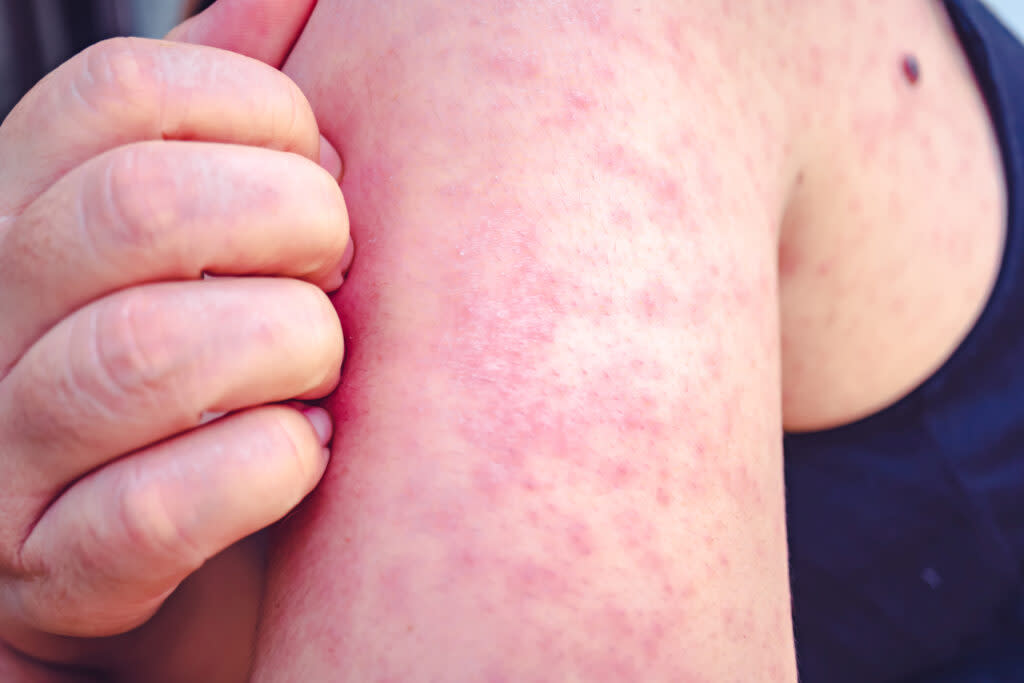West Virginia’s first measles case since 2009 confirmed in Monongalia County

Monongalia County has the West Virginia's first confirmed case of measles since 2009. (Getty Images)
An adult resident of Monongalia County has tested positive for measles, the state’s first known case of the disease since 2009, officials say.
The patient developed symptoms of the disease and sought treatment at an outpatient clinic of WVU Hospitals last week, according to news releases Monday from the hospital system and the Monongalia County Health Department. Lab work confirmed the case Sunday. The patient did not require hospitalization and is recovering at home.
“Monongalia County Health Department is diligently working with WVU Medicine to identify all people who came into contact with the patient within the WVU Medicine system and is actively reaching out to inform those individuals of the exposure,” Dr. Brian H. Huggins, the health department’s incoming health officer, said in the release. “Additionally, MCHD is in conversation with the patient to identify other places this individual traveled while symptomatic.”
A spokesperson for the health department said the patient was partially vaccinated for measles. The patient had recently traveled abroad, the spokesperson said, but it was not known if the patient came in contact with the virus while abroad.
Measles is a highly contagious disease that can especially be dangerous for children under 5, adults over age 20, pregnant women and those with compromised immune systems, according to health officials. Common complications of the disease are ear infections and diarrhea. It can also cause serious complications like pneumonia and encephalitis.
One to three of every 1,000 children infected with it will die from respiratory and/or neurologic complications, according to health officials.
“We really want to emphasize that this is an illness that people should take very seriously,” Huggins said in the release.
Symptoms of measles — including high fever, cough, runny nose, and red, watery eyes — can appear within seven to 14 days of contact. A rash appears three-to-five days after the first symptoms. Tiny white spots may appear inside the patient’s mouth two to three days after symptoms begin.
The disease was declared eliminated in the United States in 2000 thanks to a high percentage of people receiving a vaccine, but has resurged in recent years as rates of vaccination have decreased, according to the U.S. Centers for Disease Control and Prevention.
As of April 18, a total of 125 cases of the disease had been confirmed in 18 jurisdictions, including four states that share a border with West Virginia: Ohio, Pennsylvania, Virginia and Maryland, according to the CDC. Sixty-eight of those cases required hospitalization for isolation or symptom management.
In a statement Monday, Dr. Sherri Young, secretary of the West Virginia Department of Health, and Dr. Matthew Christian, state health officer encouraged people to be vaccinated.
“The measles vaccine is the most effective way to protect yourself and your loved ones from this preventable disease. Those who receive the vaccine are usually considered protected for life,” Young said.
“The threat of measles exposure in the United States has been growing over the last decade. We strongly encourage individuals to follow the CDC’s immunization schedule and get their children fully vaccinated as soon as they are able,” Christiansen said. “A recent measles outbreak in Pennsylvania sickened nine individuals, almost all of whom were unvaccinated.”
West Virginia’s strong school immunization laws have been cited as part of the reason the state had not had a confirmed measles case in 15 years. The state is one of only five that do not allow religious or philosophical exemptions to school-mandated vaccines, including one for measles.
At the urging of many in the medical community, Gov. Jim Justice last month vetoed a bill that would have allowed private and parochial schools to develop their own vaccination policies.
GET THE MORNING HEADLINES DELIVERED TO YOUR INBOX
The post West Virginia’s first measles case since 2009 confirmed in Monongalia County appeared first on West Virginia Watch.

